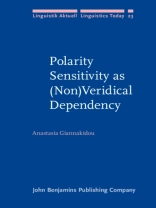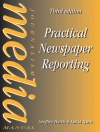Polarity phenomena have been known to linguists since Klima’s seminal work on English negation. In this monograph Giannakidou presents a novel theory of polarity which avoids the empirical and conceptual problems of previous approaches by introducing a notion wider than negation and downward entailment: (non)veridicality. The leading idea is that the various polarity phenomena observed in language are manifestations of the dependency of certain expessions, i.e. polarity items, to the (non)veridicality of the context of appearence. Dependencies to negation or downward entailment emerge as subcases of nonveridicality.The (non)veridical dependency may be positive (licensing), or negative (anti-licensing), and arises from the sensitivity semantics of polarity items. The book is also concerned with the syntactic mapping of the sensitivity dependency. It is argued that licensing does not necessarily correspond to a requirement that the licensee be in the scope of the licenser. In some cases, for instance for the interpretation of negative concord, the reverse is required: that the licensee takes the licenser in its scope. The theory is applied to an extended set of old and new data concerning affective, free-choice dependencies, and mood choice in relative clauses. The primary focus is on Greek, but data from Dutch, English, and to a lesser extend Romance and Slavic, are also considered.
Giannakidou Anastasia Giannakidou
Polarity Sensitivity as (Non)Veridical Dependency [PDF ebook]
Polarity Sensitivity as (Non)Veridical Dependency [PDF ebook]
Achetez cet ebook et obtenez-en 1 de plus GRATUITEMENT !
Langue Anglais ● Format PDF ● Pages 297 ● ISBN 9789027282286 ● Maison d’édition John Benjamins Publishing Company ● Publié 1998 ● Téléchargeable 3 fois ● Devise EUR ● ID 4222806 ● Protection contre la copie Adobe DRM
Nécessite un lecteur de livre électronique compatible DRM












